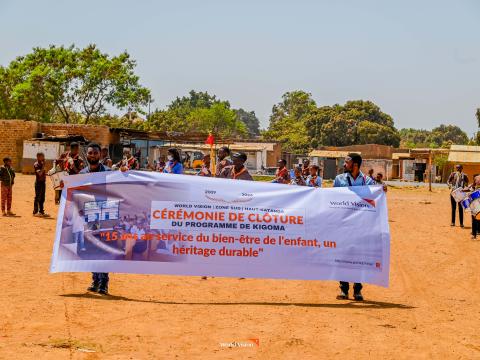After 15 years of transforming children's lives, the Kigoma programme has been closed down

By Tatiana Ballay - Communications Officer
After fifteen years of work marked by major achievements, World Vision DRC has officially closed its Kigoma programme in the commune of Kapemba, Lubumbashi, in the province of Haut-Katanga. The ceremony was held at the Garengaze church, in the presence of local dignitaries, children, religious leaders, World Vision staff and the community, bearing witness to the collective commitment and progress made since 2009.
Representing the Mayor of the city of Lubumbashi, Mr Léonard Ilunga attended a ceremony marked by gratitude. The ceremony began with an opening prayer, followed by a welcome speech by Dodo Ngoy, Chairman of the Wellbeing Committee. He outlined the programme's achievements over the last fifteen years. He described this period as a ‘time of growth and light for the community of Kigoma. World Vision is leaving behind beautiful memories in Kigoma, memories that we will never forget’, he declared, calling for continued collaboration between the various community structures to ensure the sustainability of the programme's achievements.
An inspiring sermon and a tribute to collaboration
Bishop Wamba of the Orthodox Church then delivered a sermon inspired by Genesis 13:9, recounting the separation of Abraham and Lot. This allegory of separation perfectly reflected the theme of the ceremony: the end of a fruitful partnership between World Vision and the community of Kigoma, marked certainly by a certain amount of pain, but also by hope for a prosperous future.
Review and achievements
John Kambole, the Lubumbashi Cluster Manager, described the many achievements of the Kigoma programme, highlighting the challenges overcome and the concrete results obtained for the benefit of the community:
‘Since 2009, thanks to a strong partnership with the community, we have made significant progress in Kigoma. World Vision has installed 31 boreholes for drinking water, with four more in the process of being completed, making it possible to serve almost 10,000 people. Around 250 hand-washing kits have been supplied to 28 schools and health centres, helping to reduce water-borne diseases. We have also financed the construction and equipping of the Bakandja health centre, installed six incinerators in other centres, and strengthened the capacity of 127 healthcare providers in collaboration with the Tshamilemba health zone. In the field of education, nine classrooms have been built, equipped with 180 desks, as well as a multi-purpose hall and latrines in six schools.
These efforts have enabled almost 10,225 pupils, including 4,257 girls, to receive a quality education. We have also trained 47 young people in driving, 23 in bricklaying, and 412 girls in dressmaking, integrating them into the job market. In addition, 25 young people, including six girls, have been trained in carpentry. Finally, the programme has enabled almost 12,500 children, including 6,181 girls, to be sponsored. More than 600 families have benefited from support for livestock farming activities, and 89 savings groups, comprising 2,225 households, have saved a total of $180,000 (around 450 million Congolese francs) over the past five years’.
Testimonials and recognition
Several members of the community then shared their moving testimonials. Martin Ayumbi expressed his gratitude for the agricultural training courses, which have transformed farming into an income-generating activity. Cédric emphasised the positive impact of the savings groups on households, while Dodo Ngoy spoke of the school infrastructure developed by World Vision, which has enabled the number of classes to be increased from three to twelve, a source of pride for the families. Ms Marie Ngoy, for her part, spoke of the improved access to drinking water, which has not only made the inhabitants safer, but has also enabled the children to concentrate more on their education.
Gemima Kasongo, the coordinator of an awareness-raising platform for young people, praised World Vision's action in favour of children's rights, before the ceremony continued with a visit to the stands where the organisation's achievements were on display. The mayor's representative, Léonard Ilunga, took time to appreciate the many achievements visible at these stands. Dr Lucie Lubondo, head of the Tshamilemba health zone, expressed her gratitude for the training and support she had received, which had made it possible to better manage epidemics such as measles and cholera.
Closure and prospects
The ceremony was marked by a speech by Patrick Nshimba, Interim Director of World Vision in the South Zone, who thanked the community of Kigoma for its collaboration, the administrative authorities for their support and the local partners for their commitment. He also praised the lasting impact of World Vision's actions in favour of children's well-being, while expressing the hope that the community would continue to prosper and preserve the achievements of the programme.
The ceremony was then officially closed by Léonard Ilunga, representative of the Mayor of Lubumbashi, who encouraged the assembly with these words:
‘The road to development is long, but every step counts. Together, we have made great progress, and together, we will continue to move forward for the well-being of our communities and the future of our children'.
A family photo rounded off the ceremony, which will live long in the memory of the Kigoma community.